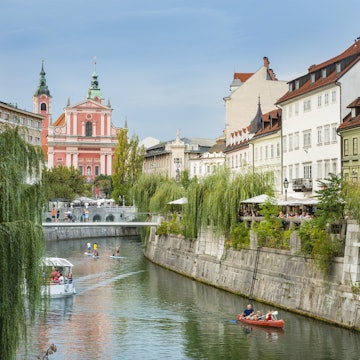
This KAYAK.com feature can help you find eco-friendly flights
Sponsored by

Nov 17, 2020 • 3 min read

Air travel can have a big impact on the environment, but there are a few things you can do to find eco-friendly flights © Orbon Alija / Getty Images
There was once a time when choosing a flight meant finding the cheapest, most convenient route. But times have changed. As travelers have become more aware of the effects that their travels have on the environment, there’s an increasing demand for eco-friendly ways to take to the skies.
Air travel can be a significant contributor of carbon emissions. To put it into context, using a carbon emissions calculator from the International Civil Aviation Organization (ICAO), a round-trip flight from New York to Tokyo adds 1.02 tons of CO2 to the atmosphere per passenger. Data from the World Economic Forum says that the average American is responsible for 16.5 tons of carbon dioxide per year.
KAYAK’s eco-friendly filter
To help travelers find the most convenient and environmentally friendly way to travel, KAYAK.com has an eco-friendly search filter.

The filter works two ways. First, it looks for the more efficient aircraft. Newer long-haul models that use two engines, such as the Boeing 787 or Airbus A350, are more efficient than older models that use four engines, like the 747 or A380.
Next, the filter highlights routes with the fewest stops. Taxiing on the runway, taking off and landing are when aircraft produce the largest amount of emissions, so nonstop flights are generally more efficient than multi-stop journeys. You can also set the filter to display only eco-friendly flights.

Other ways to make air travel more eco-friendly
In addition to choosing lower-emission flights, travelers can do more to ensure their air travel is convenient and eco-friendly.
Fly coach - Flying economy class can also lighten an individual’s carbon footprint. According to a study by the World Bank, first-class fliers have a carbon footprint as large as seven times that of passengers in economy. Because extra space is a premium feature of business and first-class cabins, the overall carbon load is spread among fewer people. Choosing economy class ensures a single flight’s carbon emissions are spread among more people. You can easily filter by cabin class on KAYAK to see economy options.
Buy carbon offsets - Although an imperfect solution to the problem of climate change, carbon offsets can help rebalance a reliance on fossil fuels. A traveler can calculate the cost of their carbon footprint, and then purchase carbon offsets that then fund a project that protects forests, plant more trees, build solar panels and more. To find accredited carbon offset programs, look for a reputable organization that certifies carbon offset projects, such as Gold Standard.
Order the vegan option - Meat production has a large impact on the environment. Meat products have larger carbon impacts per calorie than vegetable products because of the inefficient way plant energy is converted into animal meat. Opting for the vegetarian or vegan in-flight meal might seem like a small thing, but with around a billion in-flight meals served every year, it can make an impact.

Pack light - Passenger weight makes up only a small fraction of what makes one flight more efficient than another, but the simple fact is that a lighter plane is more efficient. So leave those extra pairs of shoes behind and consider traveling with carry-on luggage only.
Choose destinations that prioritize sustainability - As sustainability has become increasingly important to citizens and travelers around the world, many destinations have enacted eco-friendly initiatives. Ski towns like Breckenridge and Vail in Colorado have implemented policies that emphasize public transportation and cycling as alternatives to car transport, as well as other programs that focus on waste diversion and renewable energy. In Europe, Slovenia has rolled out a program that manages tourism flow to minimize the impact of mass tourism on compact, historic destinations like its capital, Ljubljana.
You might also like:
How these Caribbean islands are supporting sustainable agriculture
Learn about Panama's Indigenous people and cultures on this new circuit
7 stunning eco-hotels for the environmentally conscious traveler in 2021
Sponsored by Kayak
As a travel entertainment and inspirational media outlet, we sometimes incorporate brand sponsors into our efforts. This activity is clearly labeled across our platforms.
This story was crafted collaboratively between Kayak and Lonely Planet. Both parties provided research and curated content to produce this story. We disclose when information isn’t ours.
With sponsored content, both Lonely Planet and our brand partners have specific responsibilities:
-
Brand partner
Determines the concept, provides briefing, research material, and may provide feedback.
-
Lonely Planet
We provide expertise, firsthand insights, and verify with third-party sources when needed.













